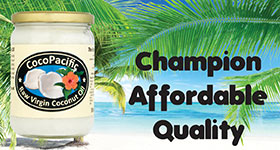|
|
Coconut oil and medium chain triglycerides – Dr Bruce Fife |
Dr. Bruce Fife is the Director of the Coconut Research Centre, www.coconutresearchcenter.com a non-profit organisation dedicated to educating the public and medical profession about the health aspects of coconut. |
The Healthier our foods are, the healthier we are, so it is important that we eat the foods that provide the most benefit. Some foods are good because they are loaded with vitamins and minerals as well as fibre. A few are classified as functional foods because they provide health benefits beyond their nutritional content. These foods have therapeutic value that can protect us from many common health problems. One such miracle of nature is coconut, more specifically, coconut oil. Shocked? Most people are. Once mistakenly believed to be bad for the heart because of its saturated fat content, coconut oil is now known to contain a unique form of saturated fat that actually helps prevent heart disease, stroke, and hardening of the arteries as well as provide many other health benefits. Breast milk research Years ago it was discovered that human breast milk contains a unique group of saturated fats known as medium chain triglycerides. (MCT) These fats are very different from the fats in meat and vegetables that are commonly found in our foods. The fats in our food are composed almost entirely of long chain triglycerides (LCTs) Some 98-100% of the fats and oils we eat consist of LCTs. Other than breast milk, there are very few good dietary sources of MCTs. Butter and whole milk contain a small amount. But by far the richest natural source of MCTs comes from coconut. Medium chain triglycerides Uniquely, coconut oil is composed predominately of MCTs. If MCTs in breast milk protect babies then they could also protect other age groups. If this were true, then a source rich in MCTs would provide a safe and effective way to fight off infectious illnesses. Since coconut oil is the richest natural source of MCTs, researchers have studied it extensively in this respect. They have found that MCFAs, which are created from the breakdown of MCTs in coconut oil, possess very powerful anti-microbial properties. This is well documented in the medical literature. Antibiotics While antibiotics may be necessary at times, the problem with them is that they are often toxic to us as well as the bacteria they are designed to kill. They affect our health in other ways too. Antibiotics kill all the bacteria in the body, including friendly gut bacteria. In the absence of friendly bacteria in the intestinal tract, candida, troublesome yeast, is allowed to grow unrestrained. This often leads to candidiasis. MCFAs also kill disease-causing bacteria. But unlike antibiotics, they are not toxic to us and do not harm friendly gut bacteria. Since MCFAs also kill candida, the intestinal environment is left in better shape than it was before. In addition, they do not promote antibiotic resistance or the development of so-called supergerms. Antiviral Why is it so little used? In fact, coconut oil in one form or another has been used for some time. Caprylic acid, one of the MCFAs in coconut is a popular ingredient in many anti-candida formulations. Monolaurin, another coconut oil derived supplement, is used as a general-purpose antibiotic. Fractionated coconut oil, also known as MCT oil, is a common ingredient in many health and fitness products. Coconut oil has even been put into gel capsules as dietary supplements. Of course, you can also find pure liquid coconut oil in just about and health food store. Food processors have recognised the importance of MCTs in mother’s milk and have been adding it in various forms to infant formula for years. MCTs not only help protect babies from infections but they also provide an important source of nutrition. One of the differences between MCTs in coconut oil and the LCTs that are more commonly found in our diet is the way in which our bodies digest and metabolise them. MCTs digest very easily. Unlike LCTs, MCTs do not need pancreatic digesting enzymes or bile for digestion. Because they digest so quickly, they provide a quick source of nutrition without taxing the enzyme systems of the body. Studies have shown that when premature infants are given formulas containing MCTs they grow faster and have a higher survival rate. This is another reason why they are added to commercial infant formulas. As the name implies, long-chain triglycerides are larger the medium-chain triglycerides. The size is extremely important because our bodies digest and metabolise each fat differently based on its size. Therefore, the physiological effects of MCTs from coconut oil are distinctly different from those of LCTs. These differences have a pronounced impact on our health. Fat digestion This is the source of the fat that collects in our fat cells and the fat that collects in and clogs up artery walls. As the lipoproteins get smaller they eventually go into the liver. In the liver they are dismantled and used for energy or repackaged into new lipoproteins an again sent back into the bloodstream to disperse fat throughout the body. MCTs are processed differently. When we eat a fat containing MCTs, such as coconut oil, it travels through the stomach and into the small intestine. But since MCTs digest quickly, by the time they leave the stomach and enter the intestinal tract they are already broken down into individual fatty acids (MCFAs). Therefore they do not need pancreatic enzymes or bile for digestion. Since they are already reduced to fatty acids as they enter the small intestine, they are immediately absorbed into the portal vein and sent straight to the liver. In the liver they are preferentially used as a source of fuel to produce energy. MCFAs bypass the lipoprotein stage in the intestinal wall and in the liver. They do not circulate in the bloodstream to the degree that other fats do. Therefore, they do not supply the fat that collects in fat cells nor do they supply the fat that collects in artery walls. MCFAs are used to produce energy, not body fat or arterial plaque. The easy assimilation of MCTs by the body allows increased absorption of other nutrients. Studies show that MCTs enhance the absorption of minerals, particularly calcium and magnesium. They improve the absorption of some of the B vitamins, the fat-soluble vitamins (A, D, E, K and beta-carotene), as well as amino acids. Nature was wise in adding MCTs to breast milk. Because MCTs provide a quick source of nutrition and improves absorption of other nutrients, coconut oil has been recommended in the treatment of malnutrition. Studies have shown that when coconut oil is added to the diets of malnourished children their recovery is quicker. Keep in mind that coconut oil does not necessarily supply all the missing nutrients. It simply makes what nutrients that are already present in the diet more bio-available. Bruce Fife, ND is the author of several books including ‘Coconut Cures’, Eat Fat Look Thin, Coconut Lovers Cookbook etc
Click here for LINKS to manufacturers of nutrition and food supplements Click here for more articles on EFAs First Published in 2009 |








